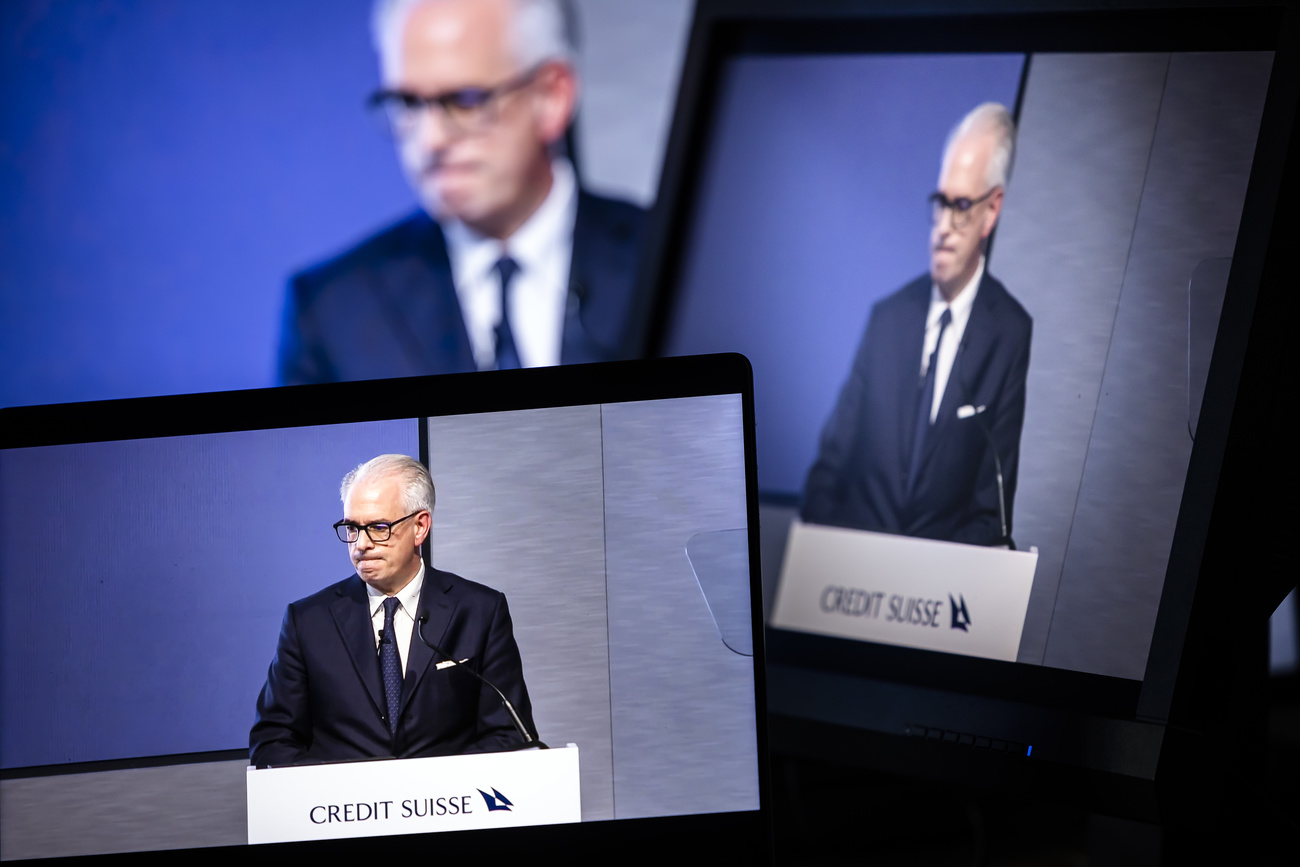
Where did it all go wrong for Credit Suisse?

Widespread analysis of what went wrong at Credit Suisse converges on a constant theme: an international bank that lost touch with its Swiss roots, led by people who put profits ahead of prudence.
This has resulted in massive financial losses and a restructuring drive that will see 9,000 staff lose their jobs.
What happened?
Credit Suisse has lurched from one scandal to another: spying on a former employee, a criminal conviction for allowing drug dealers to launder money, entanglement in a Mozambique corruption case, a chairman violating Covid lockdown rules and a massive leak of client data to the media.
+ The financial consequences for Credit Suisse in 2022
The bank’s credibility was further hit by soured investments in British financial firm Greensill Capital and US fund Archegos Capital Management, both of which collapsed in 2021.
The $10 billion (CHF9.2 billion) of client funds invested in Greensill are unlikely to be recovered in full. And while it was not the only bank to be burnt by Archegos, Credit Suisse took far greater losses ($5.5 billion) than its rivals.
The Swiss financial regulator slammed the bank for wilfully ignoring more than 100 red flags as it was lured off the edge of a cliff in pursuit of phantom profits.
How did this happen?
Using hindsight to identify a self-destructive risk culture is the easy part. But it’s harder to explain how this was allowed to happen, particularly when so many analysts insist that the risks were obvious to spot.
In such circumstances, the finger of blame points to the bank’s leadership.
Former Credit Suisse CEO Oswald Grübel says the rot started when he was replaced in 2007 by the American head of investment banking, Brady Dougan.
“[Investment banking] was the only business that interested him,” Grübel told Blick newspaper in October. “He expanded it because financial incentives are greatest there. Private banking and Swiss-focused businesses were not his priorities.”
But while Dougan’s successors preached greater risk responsibility after his departure in 2015, this appears not to have been put into practice.
Senior risk and compliance heads, hired well after Dougan left the bank, are among the ranks of management to have been given the boot amid the latest financial wreckage.
Other commentators blame Urs Rohner, who chaired the bank between 2011 and 2021.
The consequences
The bottom line is mounting financial losses, a plunging share price, an exodus of wealthy clients and the bank’s credibility being rapidly eroded.
The bank is so integral to the Swiss economy that it is deemed “too big to fail” by the financial regulator.
But Credit Suisse also has another important, less tangible value. The bank was founded in 1856 by the iconic industrialist Alfred Escher to help fund Switzerland’s rail system, a crucial plank in the country’s industrial renaissance.
This might explain why so many people in Switzerland blame the bank’s current woes on Anglo-Saxon financial excesses weakening its Swiss roots.
Revival attempt
Credit Suisse’s new management team launched the bank on a radical restructuring drive in 2022 aimed at shedding parts of its riskier trading units, slashing jobs and bringing in extra capital, mainly from the Middle East.
+ Read more about the Credit Suisse restructuring plan
“The bank will build on its leading Wealth Management and Swiss Bank franchises,” Credit Suisse promised in October 2022.
“We will remain absolutely focused on driving our cultural transformation, while working on further improving our risk management and control processes,” said chair Axel Lehmann.
But the market confidence in Credit Suisse collapsed only months into the restucturing drive, leading to a frantic dash to sell the bank to UBS.
This article was updated in March 2023 to reflect new events in the Credit Suisse story.
Timeline of recent key events and characters
February 2020: CEO Tidjane Thiam is forced to step down in the midst of a scandal about the bank employing private detectives to spy on a former executive.
March 2021: Greensill Capital and Archegos Capital Management collapse, exposing the bank to billions in losses.
April 2021: long standing chair Urs Rohner (2011-2021) steps down, having announced his intention to move on from the bank the previous year.
October 2021: the bank is fined $475 million for its role in a Mozambique corruption scandal dubbed the ‘Tuna bond’ fraud.
January 2022: Credit Suisse chair António Horta-Osório is forced to resign for breaching Covid lockdown rules while visiting the Wimbledon tennis tournament.
February 2022: the so-called ‘Suisse Secrets’ leak sees details of 18,000 client accounts given to the media by a whistleblower.
June 2022: Credit Suisse is the first major domestic bank to get a criminal conviction for money laundering in Switzerland, in connection to a Bulgarian drug smuggling ring.
July 2022: CEO Thomas Gottstein is forced out and replaced by Ulrich Körner.
October 2022: Körner and chair Axel Lehmann announce 9,000 job cuts and a CHF4 billion capital injection.
February 2023: Credit Suisse books a CHF7.3bn loss for 2022.
March 19, 2023: With shares in freefall and clients withdrawing billions every day, the government forces through a takeover by UBS bank.

In compliance with the JTI standards
More: SWI swissinfo.ch certified by the Journalism Trust Initiative





























You can find an overview of ongoing debates with our journalists here . Please join us!
If you want to start a conversation about a topic raised in this article or want to report factual errors, email us at english@swissinfo.ch.